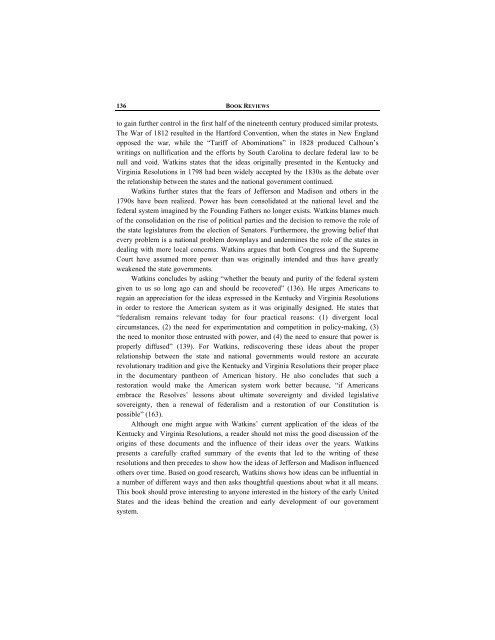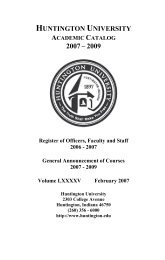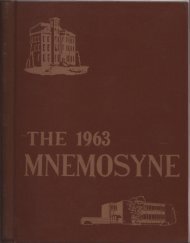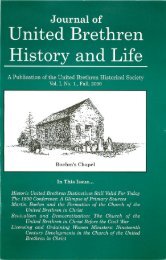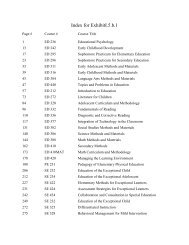Gillian Clark, Christianity and Roman Society - Huntington University
Gillian Clark, Christianity and Roman Society - Huntington University
Gillian Clark, Christianity and Roman Society - Huntington University
Create successful ePaper yourself
Turn your PDF publications into a flip-book with our unique Google optimized e-Paper software.
136 BOOK REVIEWS<br />
to gain further control in the first half of the nineteenth century produced similar protests.<br />
The War of 1812 resulted in the Hartford Convention, when the states in New Engl<strong>and</strong><br />
opposed the war, while the “Tariff of Abominations” in 1828 produced Calhoun’s<br />
writings on nullification <strong>and</strong> the efforts by South Carolina to declare federal law to be<br />
null <strong>and</strong> void. Watkins states that the ideas originally presented in the Kentucky <strong>and</strong><br />
Virginia Resolutions in 1798 had been widely accepted by the 1830s as the debate over<br />
the relationship between the states <strong>and</strong> the national government continued.<br />
Watkins further states that the fears of Jefferson <strong>and</strong> Madison <strong>and</strong> others in the<br />
1790s have been realized. Power has been consolidated at the national level <strong>and</strong> the<br />
federal system imagined by the Founding Fathers no longer exists. Watkins blames much<br />
of the consolidation on the rise of political parties <strong>and</strong> the decision to remove the role of<br />
the state legislatures from the election of Senators. Furthermore, the growing belief that<br />
every problem is a national problem downplays <strong>and</strong> undermines the role of the states in<br />
dealing with more local concerns. Watkins argues that both Congress <strong>and</strong> the Supreme<br />
Court have assumed more power than was originally intended <strong>and</strong> thus have greatly<br />
weakened the state governments.<br />
Watkins concludes by asking “whether the beauty <strong>and</strong> purity of the federal system<br />
given to us so long ago can <strong>and</strong> should be recovered” (136). He urges Americans to<br />
regain an appreciation for the ideas expressed in the Kentucky <strong>and</strong> Virginia Resolutions<br />
in order to restore the American system as it was originally designed. He states that<br />
“federalism remains relevant today for four practical reasons: (1) divergent local<br />
circumstances, (2) the need for experimentation <strong>and</strong> competition in policy-making, (3)<br />
the need to monitor those entrusted with power, <strong>and</strong> (4) the need to ensure that power is<br />
properly diffused” (139). For Watkins, rediscovering these ideas about the proper<br />
relationship between the state <strong>and</strong> national governments would restore an accurate<br />
revolutionary tradition <strong>and</strong> give the Kentucky <strong>and</strong> Virginia Resolutions their proper place<br />
in the documentary pantheon of American history. He also concludes that such a<br />
restoration would make the American system work better because, “if Americans<br />
embrace the Resolves’ lessons about ultimate sovereignty <strong>and</strong> divided legislative<br />
sovereignty, then a renewal of federalism <strong>and</strong> a restoration of our Constitution is<br />
possible” (163).<br />
Although one might argue with Watkins’ current application of the ideas of the<br />
Kentucky <strong>and</strong> Virginia Resolutions, a reader should not miss the good discussion of the<br />
origins of these documents <strong>and</strong> the influence of their ideas over the years. Watkins<br />
presents a carefully crafted summary of the events that led to the writing of these<br />
resolutions <strong>and</strong> then precedes to show how the ideas of Jefferson <strong>and</strong> Madison influenced<br />
others over time. Based on good research, Watkins shows how ideas can be influential in<br />
a number of different ways <strong>and</strong> then asks thoughtful questions about what it all means.<br />
This book should prove interesting to anyone interested in the history of the early United<br />
States <strong>and</strong> the ideas behind the creation <strong>and</strong> early development of our government<br />
system.


